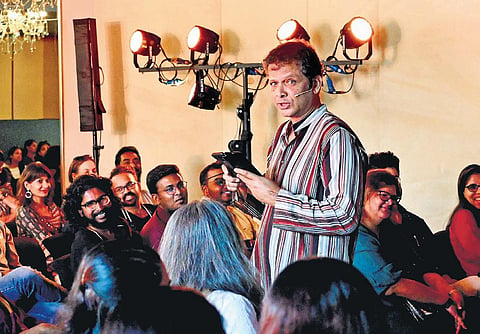

BENGALURU: For acclaimed author and poet Jerry Pinto, one of the key experiences that shaped his literary life was the discourses he undertook in his twenties in meetings of like-minded bards and thinkers known as the Poetry Circle in Mumbai. “This was many years ago. But when Menka Shivdasani, R Raj Rao, Akil Contractor and Nitin Mukadam came together to create the Poetry Circle, it was really significant for people like us.
For ten years, we sat and talked about poetry. That was such a formative experience. Usually, literary festivals are dominated by fiction and non-fiction. Big names like Amitav Ghosh and Manu S Pillai will come, and they will receive a packed hall. Poets don’t get that unless you’re coming from a film background. So poets have to learn to support each other because nobody else will,” shares Pinto, who penned the poetry collection Asylum and Other Poems, when we met him at the recently-concluded Bengaluru Poetry Festival.
Gatherings like the Poetry Circle where writers and poets came together to discuss the art and craft of it all are now a rare sight comparable to spotting a unicorn. You might need a butterfly effect to reorder the workings of the world to make such groups a common occurrence. But while fewer in number, there still happen to be avenues that echo similar notions, especially on the internet. But for Pinto, nothing beats the live debate. “I think an online group is fine. If it works for you, then great.
The present generation lives so much in the virtual world that I understand they might find an online setting more comfortable. But I feel it is difficult to have a group that does both criticism and shows support. I believe there are more support groups online where someone would like your poem and appreciate it. In the Poetry Circle, we did that, but we also questioned various aspects of the poem from certain lines to what the poet is trying to say,” says the 57-year-old.
Pinto feels poetry in English is at risk. “Look at the history of Indian poetry in English. You will have a book that will come out, and then there will be silence. The book will have a print run of 1,000 copies, but once that run ends, they don’t do a second round. Then when you will die, they will bring out your collected works. It is not so in Hindi, for instance. Some publishers consistently bring out the latest poetry by new and old poets. You can go to their website and order from a vast library of collections – both the old and the new. They are all still in print. It is not that way in English. But some big and small-time publishing houses are doing their part to better this situation,” says the author of Em and the Big Hoom, for which he won the Sahitya Akademi Award in 2016.
Pinto has been known to dabble with humour in his writing as well as his talking. Some people have the opinion that laughter can only be used to lessen the blow or to make light of a situation, but Pinto disagrees. “There is a dark side to humour, which most people forget about. We usually look at laughter as the best medicine, it is curative and a human response. But when you’re being laughed at, it is very hurtful. That’s the dark side. You can laugh a child into suicide. So, humour is a potent tool, but you have to figure out how to use it. It is a powerful weaponry. Every dictator has been afraid of the comic because
the comic points out that the emperor has no clothes,” he concludes.